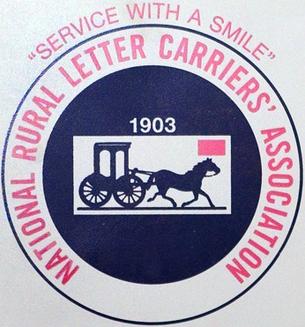
The United States Postal Service (USPS), also known as the Post Office, U.S. Mail, or Postal Service, is an independent agency of the executive branch of the United States federal government responsible for providing postal service in the U.S., including its insular areas and associated states. It is one of the few government agencies explicitly authorized by the Constitution of the United States. The USPS, as of 2021, has 516,636 career employees and 136,531 non-career employees.

The United States Post Office Department was the predecessor of the United States Postal Service, in the form of a Cabinet department, officially from 1872 to 1971. It was headed by the postmaster general.

Strike action, also called labor strike, labour strike, or simply strike, is a work stoppage caused by the mass refusal of employees to work. A strike usually takes place in response to employee grievances. Strikes became common during the Industrial Revolution, when mass labor became important in factories and mines. As striking became a more common practice, governments were often pushed to act. When government intervention occurred, it was rarely neutral or amicable. Early strikes were often deemed unlawful conspiracies or anti-competitive cartel action and many were subject to massive legal repression by state police, federal military power, and federal courts. Many Western nations legalized striking under certain conditions in the late 19th and early 20th centuries.
Canada Post Corporation, trading as Canada Post, is a Crown corporation that functions as the primary postal operator in Canada. Originally known as Royal Mail Canada, rebranding was done to the "Canada Post" name in the late 1960s, even though it had not yet been separated from the government. On October 16, 1981, the Canada Post Corporation Act came into effect. This abolished the Post Office Department and created the present-day Crown corporation that provides postal service. The act aimed to set a new direction for the postal service by ensuring its financial security and independence.
Franking comprises all devices, markings, or combinations thereof ("franks") applied to mails of any class which qualifies them to be postally serviced. Types of franks include uncanceled and precanceled postage stamps, impressions applied via postage meter, official use "Penalty" franks, Business Reply Mail (BRM), and other permit Imprints (Indicia), manuscript and facsimile "franking privilege" signatures, "soldier's mail" markings, and any other forms authorized by the 192 postal administrations that are members of the Universal Postal Union.

William Julian Usery Jr. was an American labor union activist and government appointee who served as United States secretary of labor in the Ford administration.
Mail fraud and wire fraud are terms used in the United States to describe the use of a physical or electronic mail system to defraud another, and are U.S. federal crimes. Jurisdiction is claimed by the federal government if the illegal activity crosses interstate or international borders.

The National Association of Letter Carriers (NALC) is an American labor union, representing non-rural letter carriers employed by the United States Postal Service. It was founded in 1889. The NALC has 2,500 local branches representing letter carriers in all 50 states, the District of Columbia, Puerto Rico, the Virgin Islands and Guam.

John E. "Jack" Potter is the president and CEO of the Metropolitan Washington Airports Authority since July 18, 2011. He is the former United States Postmaster General and CEO of the United States Postal Service (USPS), having become the 72nd postmaster general on June 1, 2001. Potter is the second longest-serving postmaster general, following Gideon Granger.

The system for mail delivery in the United States has developed with the nation. Rates were based on the distance between sender and receiver in the early years of the nation. In the middle of the 19th century, rates stabilized to one price regardless of distance. Rates were relatively unchanged until 1968, when the price was increased every few years by a small amount. Comparing the increases with a price index, the price of a first class stamp has been steady. The logo for the Post Office Department showed a man on a running horse, even as the railroads and then motorized trucks and airplanes moved mail. In 1971, the Post Office became the United States Postal Service, with rates set by the Postal Regulatory Commission, with some oversight by Congress. Air mail became standard in 1975. In the 21st century, prices were segmented to match the sorting machinery in use; non-standard letters required slightly higher postage.
The Canadian Union of Postal Workers is a public-sector trade union representing postal workers including letter carriers, rural and suburban mail carriers, postal clerks, mail handlers and dispatchers, technicians, mechanics and electricians employed at Canada Post as well as private sector workers outside Canada Post. Currently comprising upwards of 50,000 members, the Canadian Union of Postal Workers has historically been labeled as militant because of some of the actions undertaken since its inception in 1965 to help guarantee rights to all postal workers. According to former president Jean-Claude Parrot, "We succeeded to get the support of the membership because we earned our credibility with them...we got that reputation [of militancy] because we earned it."

The United States Postal Regulatory Commission, formerly called the Postal Rate Commission, is an independent regulatory agency created by the Postal Reorganization Act of 1970. Like the Postal Service, it was defined in law as an independent establishment of the executive branch.

The American Postal Workers Union (APWU) is a labor union in the United States. It represents over 200,000 employees and retirees of the United States Postal Service who belong to the Clerk, Maintenance, Motor Vehicle, and Support Services divisions. It also represents approximately 2,000 private-sector mail workers.

The U.S. postal strike of 1970 was an eight-day strike by federal postal workers in March 1970. The strike began in New York City and spread to some other cities in the following two weeks. This strike against the federal government, regarded as illegal, was the largest wildcat strike in U.S. history.

The National Rural Letter Carriers' Association (NRLCA) is an American labor union that represents the rural letter carriers of the United States Postal Service. According to its statutes, the purpose of the Association is to "improve the methods used by rural letter carriers, to benefit their conditions of labor with the United States Postal Service (USPS), and to promote a fraternal spirit among its members."

Patrick R. Donahoe was the 73rd United States Postmaster General, having been appointed to the post on October 25, 2010. A 35-year veteran of the Postal Service, he reported to the Postal Service Board of Governors.
Vincent Raymond Sombrotto was a letter carrier at Grand Central Station in New York City, and the 16th president of the National Association of Letter Carriers between 1978 and 2002. He was born in Manhattan in 1923 to an Italian father and an Irish mother. Sombrotto became an official member of the National Association of Letter Carriers in 1947 and played a huge part in the U.S. postal strike of 1970. Sombrotto helped to expand the union into more than 100 cities and involved more than 200,000 new members. He retired in 2002 and finished with over 300,000 members and died in 2013 aged 89 at Port Washington, New York.
A public-sector trade union is a trade union which primarily represents the interests of employees within public sector or governmental organizations.

Jeanette P. Dwyer is a former President And current national board member of the National Rural Letter Carriers' Association. When she was elected President in 2011, she became the first female President of a labor union in the history of the United States Postal Service. She served as NRLCA President until 2018, when she chose not to run for reelection. She was reappointed to the national board to fill the remainder of Executive Committeeman Johnny Miller's unexpired term on November 21, 2020. When the 2021 convention was canceled due to COVID-19, Dwyer was re-elected to the board at the 116th national convention in Orlando, Florida on September 9, 2022.

The Postal Service Reform Act of 2022 is a federal statute intended to address "the finances and operations of the U.S. Postal Service (USPS)", specifically to lift budget requirements imposed on the Service by the Postal Accountability and Enhancement Act and require it to continue six day a week delivery of mail.













